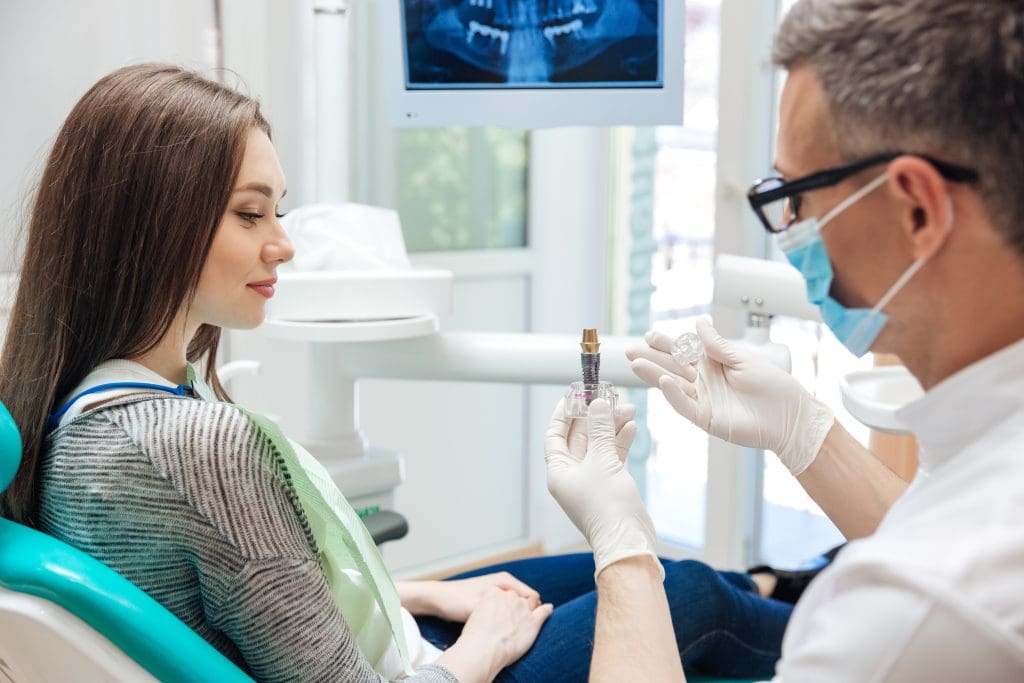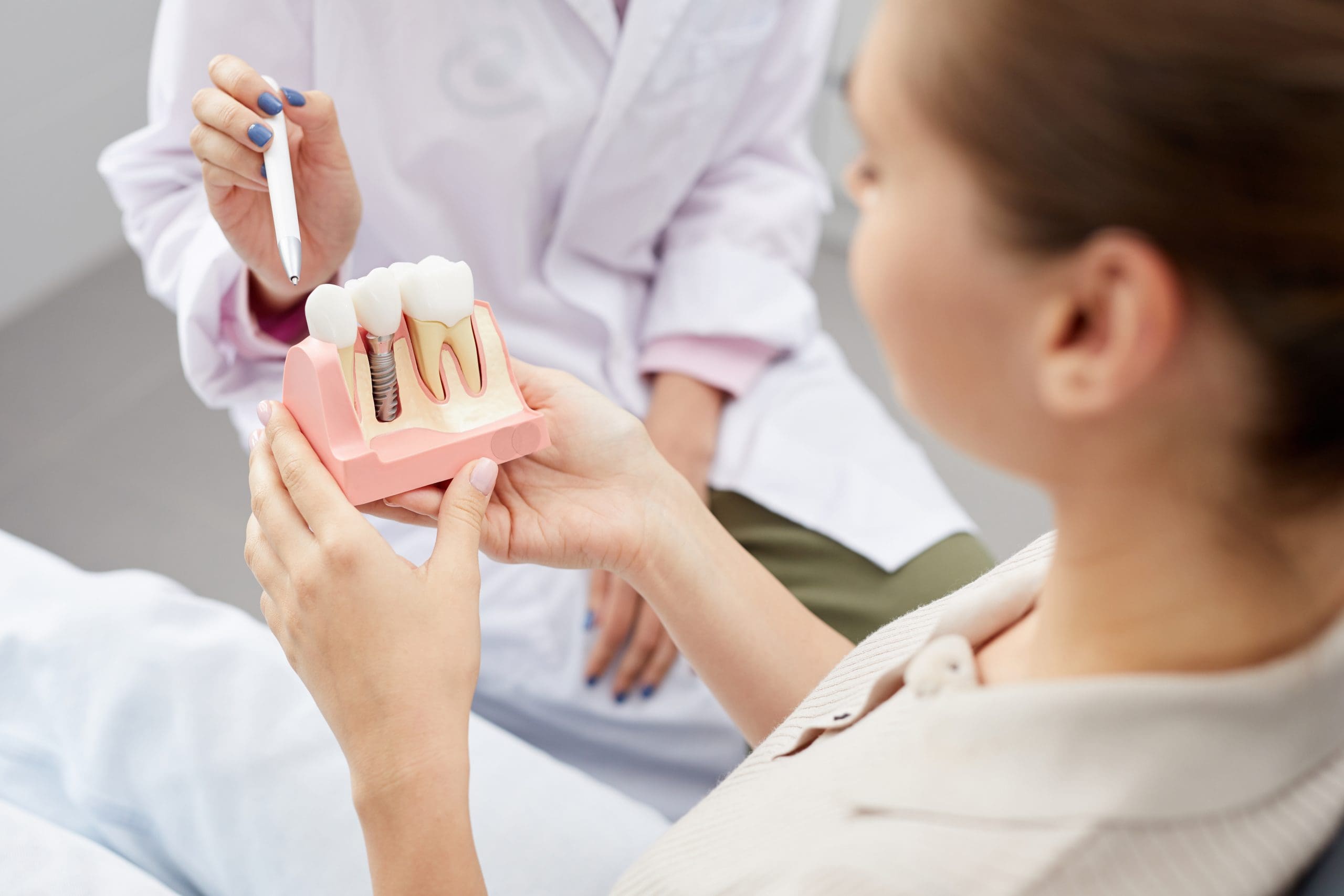Imagine finding yourself in a situation where, due to an unfortunate accident or severe dental disease, you’ve lost several teeth. The impact is physical, causing difficulty in eating and speaking, and psychological, potentially affecting your confidence and self-esteem. Living with missing teeth can be challenging. However, we live in a time when dental implant technology is available to restore your smile and function. Dental implants are considered the best solution for missing teeth, mimicking the look and function of natural teeth. But are you a good candidate for full dental implants? Let’s find out.
In this blog post, we’ll discuss what full dental implants are, how they work, and who is the best type of candidate for them. We will also discuss other options for missing teeth, such as dental bridges, dentures, or other teeth replacement options.
What Are Full Dental Implants?
Full dental implants, also known as full-mouth dental implants, full-mouth reconstruction, or full arch replacement, involve replacing an entire set of upper or lower teeth with dental implants. This procedure is typically recommended for people who have lost all or most of their teeth due to various reasons, including accidents, injuries, severe tooth decay, or gum disease.
Unlike a dental bridge, crown, or veneer, the entire process of placing full implants involves surgery. Full mouth implants involve placing multiple implants in the jawbone and attaching a permanent prosthetic arch on top. During the procedure, the dentists insert titanium posts into the jawbone to serve as replacements for missing tooth roots. This way, the entire set of lost teeth can be replaced with a secure and strong solution.
How Does A Dental Implant Work?
Full dental implants involve an invasive surgery that includes placing several titanium posts in the jawbone, which act as the artificial teeth roots. A tooth implant fuses with the jawbone over time through a process called osseointegration, providing a stable and durable base for the prosthetic teeth.
Once the implants have fully healed and integrated with the bone, abutments are attached to the implants. These act as connectors between the implants and the prosthetic arch. The prosthetic arch is custom-made to match your natural teeth in color, shape, and size, providing a natural-looking and functional replacement for your missing teeth.
Who Is A Candidate For Full Mouth Dental Implants?
Full dental implants are suitable for individuals who have lost all or most of their teeth and are looking for a permanent, long-term solution. However, not everyone is an ideal candidate for full-mouth dental implants. Here are some factors that may determine your candidacy for this procedure.
1. Sufficient Bone Density
Since multiple implants need to be placed in the jawbone, it is essential to have sufficient bone density to support them. If you’ve had significant bone loss in your jaw due to tooth loss or other reasons, your dentist may require bone grafting before proceeding with full mouth implants.
2. Good Overall Health
Dental implant surgery involves minor oral surgery, and candidates need to be in good overall health. People with chronic medical conditions such as diabetes, heart disease, or autoimmune disorders may not be suitable candidates for full dental implants.
3. No Active Gum Disease
Gum disease is a common cause of tooth loss, and if you have active gum disease, it must be treated before proceeding with full dental implants. This is to ensure that the implants have a healthy foundation to attach to and prevent any complications.
4. Commitment To Oral Hygiene
Dental implants, like natural teeth, require proper oral hygiene to ensure longevity and success. Candidates for full dental implants should maintain good oral hygiene habits for their natural and artificial teeth, such as brushing, flossing, and regular dental check-ups.
Other Options For Tooth Replacement

If you are not a suitable candidate for full-mouth dental implants, don’t worry. Your dentist can recommend another treatment option based on your specific needs. These include crowns, dental bridges, dentures, and implant-supported teeth bridges or dentures.
- Crowns – For most patients, crowns are the traditional option for missing teeth. Crowns are used to cover damaged or decayed teeth. While they can provide functional and aesthetic benefits, a crown may not be as secure and durable as an implant.
- Dental Bridges – Dental bridges involve using healthy adjacent teeth to support a prosthetic tooth or set of teeth, while dentures are removable appliances that replace multiple teeth. A dental bridge, on the other hand, involves placing dental implants to support a bridge or denture for a more secure and natural-looking solution.
- Dentures are an extremely common and affordable option for replacing multiple missing teeth. They can be made to look natural and fit comfortably, but they do require daily care and maintenance. Additionally, they may not be as stable and secure as dental implants or bridges.
- Implant-Supported Teeth Bridges Or Dentures – An implant-supported teeth bridge or denture may be the best option if you are missing multiple teeth in a row. This involves placing two or more implants to support a bridge of prosthetic teeth, providing a strong and natural-looking solution for lost teeth.
For Dental Implants And Bridges in Kenosha, WI, Turn To Pat Crawford, DDS
When it comes to dental implants and bridges in Kenosha, WI, you can trust our experienced and compassionate dental team at Pat Crawford, DDS. We offer a wide range of tooth replacement options, including implants, bridges, removable partial dentures, crowns, and more. Contact us today to schedule a consultation and see how we can create a healthy, beautiful smile that makes you feel confident and comfortable.


